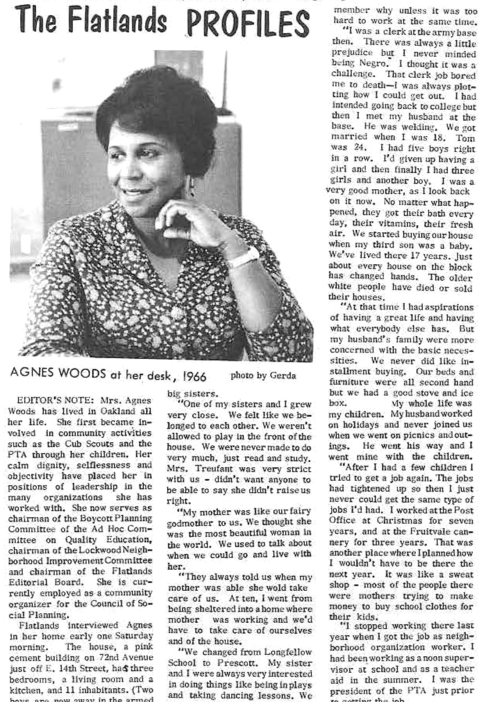This profile of Agnes Woods—then serving as Chairman of The Flatlands‘ editorial board—suggests both how black women were drawn into community organizing in the mid-’60s, and how, in their organizing, they put to good use their previous experience in women-centered voluntary associations.
Like other members of The Flatlands‘ editorial board (for instance, Bill Goetz and Bill Lowe), Woods made her way up from hardscrabble beginnings. Her Cape Verdean father died of diabetes when she was young, and her mother was ill and unable to take care of her. For several years she was raised by another, more prosperous family; at age ten she and her siblings returned to stay with her mother—or, as she describes it in the interview, “I went from being sheltered into being in a home where mother was working and we’d have to take care of ourselves and of the house.”
Though Woods did enroll in college for over a year—surprising her mother, who did not expect such ambitions from her—she was pulled away the demands of her wartime job as a clerk and, starting in her late-teens, by the demands of marriage and motherhood: she had eleven children with her husband, and she was solely responsible for the child-raising. “My whole life was my children,” she says in the interview, “He went his way [to work] and I went mine with the children.”
As an adult, Woods performed seasonal work — serving as a summer teacher’s aide, working at the Post Office during the Christmas crunch time — but struggled to find work equal to the job she’d performed during the war. She did, however, distinguish herself as a volunteer in groups associated with her children, working with the Cub Scouts and rising to become the head of her PTA. This latter position was the last she held before becoming a community organizer with the Council of Social Planning (CSP) — a position that, in turn, led to her involvement with the Lockwood Neighborhood Improvement Committee and her work with The Flatlands.
As might be expected from her long history of involvement with Oakland public schools, Woods was a central figure in the protests against educational inequality, becoming a driving force on the Ad Hoc Committee for Quality Education and helping to organize, in 1966, both the Oakland school boycott and the freedom schools that served as an alternative form of education during that boycott.
